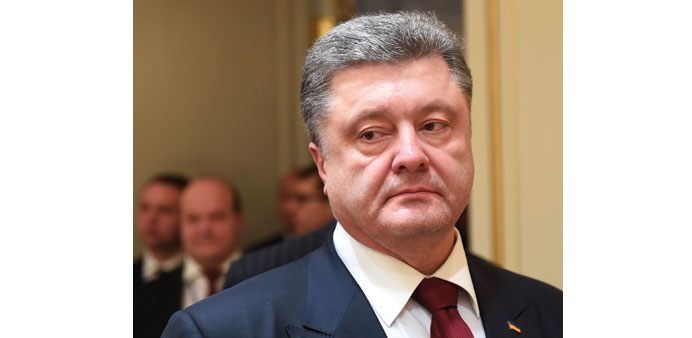AFP
Kiev
Ukrainian President Petro Poroshenko convened his generals yesterday to discuss the latest failed bid to negotiate an end to clashes with pro-Russian rebels that saw seven troops killed in another wave of attacks.
Poroshenko has found himself trapped between more militant Ukrainian nationalists and Western leaders who hope to see an end to 16 months of fighting in the European Union’s backyard.
The pro-EU leader sent his personal envoy to the Belarussian capital Minsk on Monday to discuss a new weapons withdrawal agreement with rebel and Moscow negotiators.
However, the European-mediated negotiations fell apart after more than six hours due to what one separatist said was Kiev’s refusal to pull back its armed forces from four strategic sites.
“We need to clearly determine a plan for strengthening our defences in case of the conflict’s escalation,” the presidency quoted Poroshenko as telling members of Ukraine’s powerful National Security and Defence Council and top ministers.
Council Secretary Oleksandr Turchynov reported the death of three more soldiers in overnight rocket attacks.
Kiev said four of its troops had been killed on Monday and the rebels reported one loss in the past two days.
The Ukrainian government and its Western allies fear that the war – which has already killed nearly 7,000 people – may turn into a “frozen conflict” in which low-level violence becomes a constant menace that leaves much of eastern Europe on a permanent state of alert.
Turchynov blamed the latest clashes on Russian soldiers whom the Kremlin has repeatedly denied sending into its southwestern neighbour’s industrial heartland.
“Russia’s demonstratively provocative conduct is undermining all attempts at a peaceful solution,” Turchynov said in a statement.
A daily report released by monitors from the Organisation for Security and Co-operation (OSCE) mentioned the “claimed” presence of Russian paratroopers at a rebel weapons storage site.
“An armed man guarding the facility at one of the sites claimed that he and those present at the site were part of the 16th airborne brigade from Orenburg, Russian Federation,” the OSCE report said.
Kremlin spokesman Dmitry Peskov vowed to look into the findings but expressed doubts about their validity.
Moscow’s state-run Sputnik news agency later released an English-language report stating that “there is no 16th airborne brigade in the Russian armed forces, and no Russian airborne brigades are stationed in Russia’s Orenburg region”.
An OSCE spokesman said he could add no further details to what the purported Russian soldiers had told his team.
The Kremlin has always insisted that any Russians captured or seen in the war zone were either off-duty soldiers or volunteers who had no special instructions to fight from the army.
Ukraine’s new information policy ministry – derided by critics as an ill-advised state propaganda agency – said that the soldiers’ claim to be Russian was aimed at “discrediting Ukrainian media and the OSCE”.
Continued fighting and Kiev’s defence spending has accelerated an economic meltdown that makes Ukraine dependent on foreign aid.
The International Monetary Fund has arranged a $40bn (€36.5bn) global rescue package that requires Kiev to restructure more than $15bn in debt payments over the coming four years.
Ukraine’s finance ministry said it had sent its biggest private lenders a revised offer that is “fully in compliance with the targets of the IMF-supported programme”.
The two sides have spent months arguing over how much of the debt can simply be written off due to Kiev’s evident cash constraints.
“This week will be decisive for the negotiations,” the finance ministry said in a statement. “Accordingly, the ministry has called on creditors to attend at the highest level a meeting in London on Thursday.”
Economists believe that the two sides must find a solution by the time Ukraine must make another large debt repayment on September 23.

Poroshenko: We need to clearly determine a plan for strengthening our defences.
